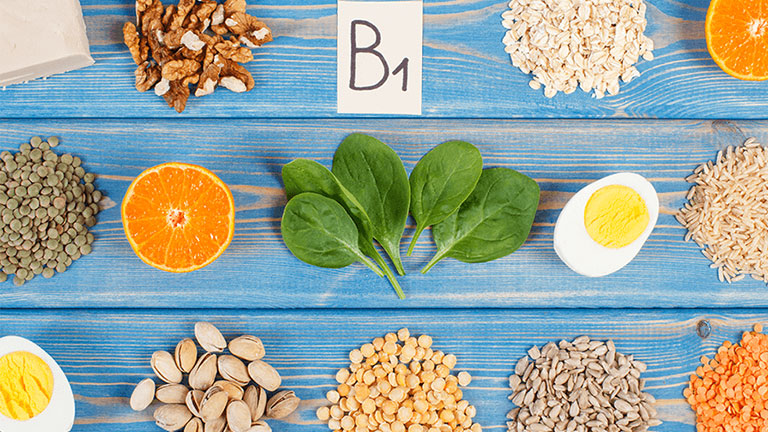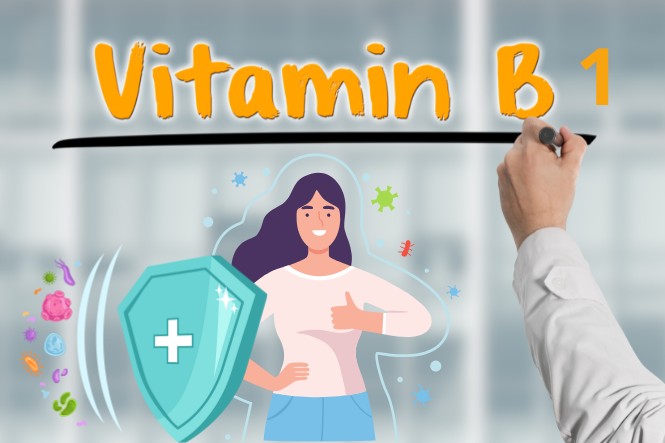Vitamin B1 – Key to Metabolism and Energy Production.
Vitamin B1, also known as Thiamine, is an essential organic compound that plays a vital role in many vital functions of the human body. As a white crystal, vitamin B1 is water-soluble and participates in many important metabolic processes.

Vitamin B1.
Introduction to vitamin B1
Vitamin B1 (Thiamine) is the first vitamin discovered in the B group, so it was named first. Vitamin B1 is water-soluble and is found in many natural foods such as beans, rice, pork, cereals, etc. In addition, vitamin B1 is also found in multivitamins or nutritional supplements.
Vitamin B1 is a component of ATP – the energy molecule of cells. Vitamin B1 participates in many vital activities of the body, related to the development, growth and function of all cells in the body.
The role of Vitamin B1
Helps ensure metabolism
Vitamin B1 is essential in the metabolism of nutrients to create ATP – a molecule that carries energy for cells. Therefore, this micronutrient helps the body have energy for life activities, eliminates boredom and fatigue, and helps life become more active. In addition, vitamin B1 metabolizes to create Glucose – an extremely important source of energy for metabolism in the body. Vitamin B1 also participates in the production of red blood cells, treating genetic metabolic disorders.
Prevents nerve damage
Body deficiency in vitamin B1 often encounters problems with neurological dysfunction such as: poor learning, always in a state of lethargy, memory loss, … Vitamin B1 also promotes the synthesis of myelin sheath to protect nerves and ensure the most effective operation.
Maintain a healthy immune system
In the human body, the longitudinal muscles of the digestive tract are where the most immune organs are located, and vitamin B1 participates in maintaining and protecting them. Conversely, a healthy digestive system also ensures better absorption of vitamin B1, thereby strengthening the overall immune system, protecting the body from pathogens.

Vitamin B1 helps maintain a healthy immune system.
Helps keep the heart healthy
Vitamin B1 is an essential ingredient to produce Acetylcholine – a special neurotransmitter between the nervous system and muscles, especially the heart muscle. Therefore, vitamin B1 plays a role in maintaining heart function, reducing the risk of heart failure and other cardiovascular diseases.
Improve memory
Vitamin B1 deficiency often causes memory problems such as lack of concentration, forgetfulness, poor work efficiency, headaches, dizziness, etc. Therefore, to ensure the brain’s memory function, supplementing enough vitamin B1 is very important. People who regularly work with computers and do work that requires high concentration also need more vitamin B1.
Improve eyesight
In the elderly, aging occurs rapidly, in which cataracts are a common disease that causes vision loss and the risk of blindness. Vitamin B1 deficiency is one of the causes of this disease, so increasing the amount of this micronutrient also helps prevent cataracts effectively.
Helps hair healthier
Not only protects general health, vitamin B1 is also a great nutrient that nourishes hair from the inside, helping women have healthy, smooth hair. Therefore, patients with hair loss, dry hair, … can use this vitamin in combination with some other drugs to stimulate hair growth, nourish healthy hair.
Helps treat acne, whiten skin
In the field of beauty, this is a type of vitamin that can treat acne, remove dark spots or pigmentation disorders on the skin. If you want healthy, rosy, bright white skin, vitamin B1 supplementation is definitely indispensable.
Foods Rich in Vitamin B1
Some foods that are high in thiamine (vitamin B1) include:
- Salmon: Salmon is high in riboflavin, niacin, B6 and B12, as well as a good source of thiamine and pantothenic acid. It is also low in mercury and high in omega-3 fats and protein.
- Green vegetables: Some green vegetables stand out for their folate (B9) content. They are one of the highest plant sources of folate (B9), and are also high in thiamine (vitamin B1)
- Liver and organ meats: Organ meats – especially liver – have the most vitamin B.
- Eggs: One large egg contains 33% of biotin, which is distributed between the yolk and white. In fact, eggs are one of the top sources of biotin – only liver contains more. Eggs are also a good source of thiamine.
- Milk: Milk and other dairy products pack about a third of your daily riboflavin needs in just 1 cup (240 ml). Milk is also a good source of absorbed B12. Additionally, studies have shown that thiamine is present in milk.
- Beef: Beef can be a big contributor to your B vitamin intake.
- Legumes: Most beans – such as pinto beans, black beans, and lentils – are high in folate, a B vitamin that is as important as vitamin B1 for reducing the risk of birth defects.
- Chicken: Chicken is also one of the foods high in thiamine
- Cereals: Breakfast cereals are often fortified with thiamin, riboflavin, niacin, folic acid, B6, and B12.
- Sunflower seeds: Sunflower seeds are one of the best plant sources of pantothenic acid (B5), a B vitamin found in small amounts in most foods. In addition, this is also a food source rich in thiamine (vitamin B1).
- Brewer’s yeast and nutritional yeast: people use them to enhance the flavor and nutritional content of dishes. These yeasts naturally contain vitamin B and are often fortified with them – especially nutritional yeast.
To ensure adequate vitamin B1 supply for the body, you should have a varied, rich diet, including foods rich in vitamin B1.
In addition, you can also consult your doctor to use additional functional foods to supplement vitamin B1, especially when your diet is inadequate or you have a high need for vitamin B1 due to certain health factors.
Medical knowledge is always updated and changed over time. Therefore, to get the most accurate and appropriate information for your health condition, you should consult a specialist. Hopefully the above sharing will be helpful to you!





